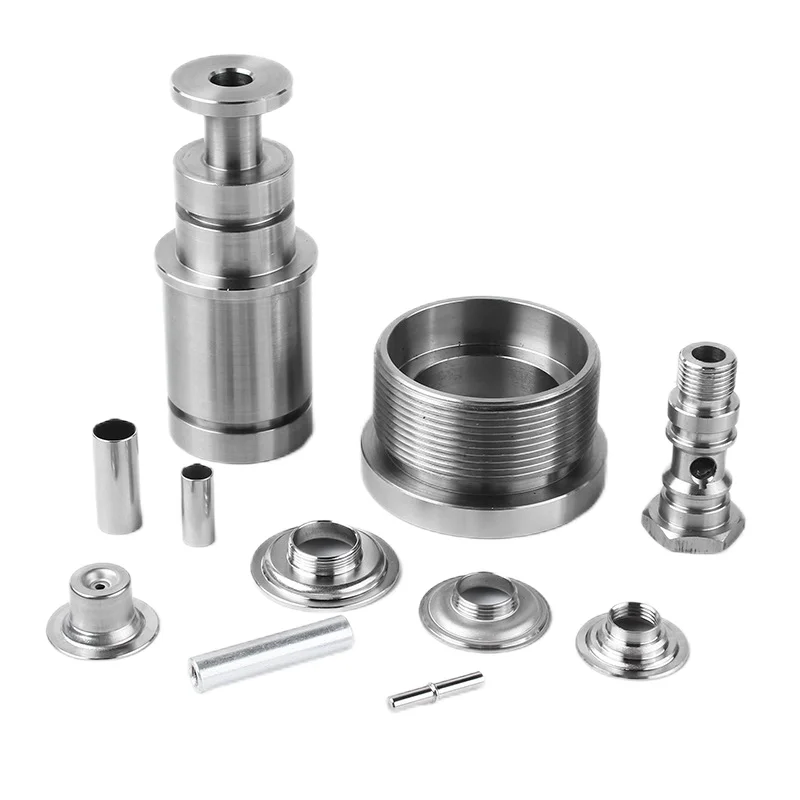- This topic is empty.
-
AuthorPosts
-
2025-10-16 at 5:14 pm #26370
In today’s fast-evolving manufacturing landscape, precision, efficiency, and repeatability are paramount. Precision CNC turning service has emerged as a cornerstone technology, enabling industries to produce highly accurate components with minimal tolerances. From aerospace to medical devices, this machining solution has transformed production standards worldwide. In this blog post, as high quality CNC turned components factory, Vibo will share the advantages of custom precision CNC turning service, its applications, materials, etc.
Understanding Precision CNC Turning Service
Precision CNC turning service involves using computer numerical control (CNC) machines to rotate a workpiece while cutting tools remove material to achieve desired shapes and dimensions. Unlike conventional manual turning, CNC technology offers unparalleled repeatability and precision, ensuring consistent quality across large production runs.
CNC lathes can handle diverse materials, including stainless steel, aluminum, titanium, and advanced polymers. The integration of high-resolution sensors and advanced software allows for micron-level tolerances, making this service ideal for industries where precision is non-negotiable.
Advantages of Utilizing Precision CNC Turning
-
High Accuracy and Consistency
By leveraging computer-controlled movements, precision CNC turning services produce components with exceptional dimensional accuracy. The consistency eliminates variability common in manual machining, reducing scrap rates and ensuring quality. -
Enhanced Efficiency
CNC turning machines can operate continuously with minimal human intervention. This increases throughput, accelerates lead times, and allows for complex geometries that would be challenging or impossible manually. -
Flexibility in Design
Modern CNC systems accommodate rapid adjustments in design specifications. Whether prototyping or full-scale production, manufacturers can swiftly modify programs to accommodate different component geometries or material requirements. -
Cost-Effectiveness in Long-Term Production
Although initial investments in precision CNC turning may be higher, the long-term benefits—including reduced material waste, lower labor costs, and minimized rework—translate into substantial savings over time.

Key Applications of Precision CNC Turning Service
Precision CNC turning service has a broad spectrum of applications across industries:
-
Aerospace: Components such as turbine shafts, fuel system fittings, and landing gear elements demand tight tolerances that only precision CNC turning can achieve.
-
Automotive: Engine components, transmission parts, and custom fittings require durable machining with exact dimensions to ensure performance and safety.
-
Medical Devices: Surgical instruments, implants, and dental tools benefit from the high accuracy of CNC turning, ensuring patient safety and regulatory compliance.
-
Electronics: High-precision housings and connectors require intricate machining for effective assembly and performance.
These applications highlight the versatility of precision CNC turning services in meeting the rigorous demands of modern engineering.
Materials and Techniques in Precision CNC Turning
The success of a precision CNC turning service lies in material selection and machining techniques. Popular materials include:
-
Metals: Aluminum, brass, copper, titanium, stainless steel, and alloys for strength and durability.
-
Plastics: Engineering plastics like PEEK, PTFE, and Delrin for lightweight and corrosion-resistant applications.
Advanced techniques enhance precision, such as multi-axis turning, live tooling, and thread cutting. Combined with computer-aided manufacturing (CAM) software, these methods optimize cutting paths, reduce machine wear, and maintain tight tolerances.
Choosing the Right Precision CNC Turning Service Provider
Selecting a reliable precision CNC turning service provider is critical to achieving the desired quality. Key factors to consider include:
-
Experience and Expertise
A provider with a proven track record in precision machining understands material behavior, cutting dynamics, and tolerance requirements. -
Equipment and Technology
Modern CNC machines, multi-axis lathes, and in-process measurement systems ensure that components meet stringent specifications. -
Quality Assurance
ISO-certified processes, advanced inspection tools, and continuous monitoring of tolerances are essential for consistent quality. -
Customization Capabilities
Providers that accommodate unique designs, rapid prototyping, and low-to-high volume production offer greater flexibility for diverse manufacturing needs.
Comparing CNC Turning to Alternative Machining Methods
While various machining techniques exist, CNC turning provides distinct advantages:
-
Versus Manual Turning: CNC eliminates human error, achieving higher accuracy and repeatable results.
-
Versus Milling: While milling is ideal for complex surface geometries, turning excels in cylindrical components and rotational symmetry.
-
Versus 3D Printing: Additive manufacturing is suitable for prototypes or lightweight parts, but precision CNC turning ensures superior surface finish, material density, and strength for functional components.
This comparison emphasizes why precision CNC turning service remains indispensable for industries requiring high-performance parts.
Innovations in Precision CNC Turning
Recent advancements have pushed precision CNC turning services into new realms:
-
High-Speed Machining: Increases material removal rates without compromising accuracy.
-
Automation Integration: Robotic loading and unloading reduce manual intervention and accelerate production.
-
Real-Time Monitoring: Sensors provide live data on vibrations, cutting forces, and temperature, optimizing tool life and process stability.
-
Hybrid Machining: Combining turning with milling and drilling in one setup reduces handling errors and increases efficiency.
These innovations ensure that CNC turning continues to evolve alongside industry demands.
Maximizing ROI with Precision CNC Turning
Companies can maximize returns by leveraging precision CNC turning service strategically:
-
Optimized Design for Manufacturability: Early collaboration with CNC experts ensures parts are designed for efficient machining.
-
Prototyping and Iteration: Rapid prototype CNC turning reduces development time and validates functionality before mass production.
-
Preventive Maintenance: Regular machine calibration and tool maintenance prevent downtime and ensure long-term accuracy.
These strategies enable manufacturers to achieve cost-effective, high-quality production while maintaining competitive advantage.
Conclusion
As industries demand ever-higher precision and efficiency, precision CNC turning service stands at the forefront of modern manufacturing. Its ability to produce complex, high-tolerance components reliably and efficiently makes it indispensable for aerospace, automotive, medical, and electronics sectors.
By embracing technological innovations, partnering with skilled providers, and leveraging best practices in design and production, manufacturers can fully harness the potential of CNC turning, ensuring both quality and profitability in an increasingly competitive global market.
-
-
AuthorPosts
- You must be logged in to reply to this topic.